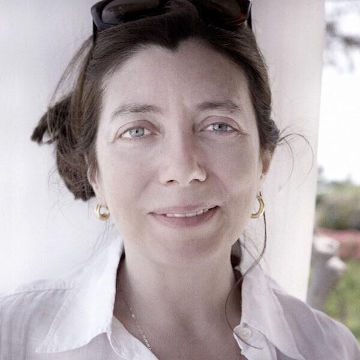
Dates: 2 > 9 July 2021 (9 am – 2 pm)
Language: Italian
For: actors, directors, playwrights aged between 20 and 40
Participants: up to a maximum of 10
WORKSHOP
The workshop will focus on the discovery of contemporary English-language playwrights, focusing on the lessons learnt from their method.
Participants will be asked to read at first sight selected scenes from a variety of texts that I have chosen and translated over the years, attending theatres in London and New York, and to approach translation and writing in a critical way, as if they were rehearsing at a table. The intention is to recite and analyse them, trying to grasp their themes, reasons, motivations, structures and language.
The colour that most evokes intensity is blue.
The sky as the vault to which the divine dimension of humanity tends, the unconscious and its infinite dark meanders, the watery density of the amniotic fluid that feeds our prenatal dreams.
The texts we will tackle will include all these shades of blue.
M. Capuani
MONICA CAPUANI
Culture-wise, I was born on the desks of the Liceo Classico Virgilio in Rome. I graduated in Italian Literature with Maria Serena Sapegno and with Professor Alberto Asor Rosa, with a thesis on Boccaccio. As a freelance journalist, I started out on the pages of Claudio Rinaldi's L'Espresso, then travelled the world for twenty years in search of stories. I also worked as a literary translator from English and French (I have translated about seventy novels).
Theatre has been an ever-present passion since I was a child when I saw Tino Buazzelli-Falstaff in Shakespeare's The Merry Wives of Windsor at the Quirino in Rome. When I was seventeen, I won the ETI theatre criticism competition three times. Tommaso Chiaretti, a critic for Repubblica, took me under his wing and, if he had not died prematurely, I might be doing his job.
I love London and contemporary theatre. I am struck by the vitality of society's participation in that civil rite of deep self-reflection. For three years, at the Italian Cultural Institute in London, I organised “Contemporary”, a series of meetings between Italian, as well as the English theatre practitioners, and the Italian Theatre Festival.
For a few years now, I have chosen the theatre full-time in a role of scout, translator, and promoter: I choose texts, translate them, and try to stimulate productions, both in Italy and abroad. To date, I have translated 125 plays.
I took part in the Biennale Teatro College 2019 as a teacher and have since held many workshops around Italy.
In addition to the personal data requested, candidates must provide the following:
· a passport photo
· curriculum vitae
· motivational letter (in Italian)
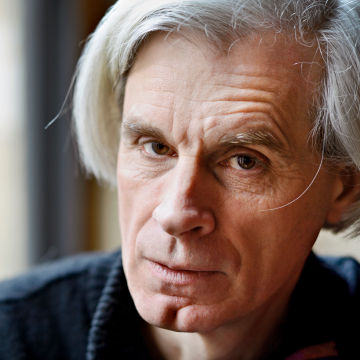
Dates: 2 > 8 July 2021 (10 am - 1 pm / 2 pm - 4 pm)
Language: English
For: writers (under 35) who have experience of writing for theatre and/or opera
Participants: up to a maximum of 10
WORKSHOP
MARTIN CRIMP: PAST - PRESENT REMIX
Drawing on his own practice of remixing myths from the past to bend and contaminate our perception of the present, playwright Martin Crimp will introduce a series of provocations — film, text, music, photography — to offer participants new ways of thinking about and developing their own theatre-writing.
This year’s Biennale Teatro celebrates the colour blue. Just as the so-called blue notes inflect the conventional scales of western music, so we will celebrate whatever dissonance can disturb our own fixed habits of thought.
MARTIN CRIMP
Martin Crimp is a British playwright whose work – characterized by its formal invention and unsentimental gaze – is widely performed across Europe and beyond. His 1997 play Attempts on her life established his international reputation. And in more recent years his powerful “remixing” of ancient myths and stories has led to plays such as The rest will be familiar to you from cinema (Deutsches Schauspielhaus, Hamburg, 2013; Festival d’Avignon, 2019); When we have sufficiently tortured each other (National Theatre, London, 2019); and the operas Written on Skin and Lessons in love and violence (both with composer George Benjamin, Festival d’Aix-en-Provence, 2012; Royal Opera House, 2018). His most recent work is a rewriting of Cyrano de Bergerac (Playhouse Theatre, London, 2019).
Photo: Katrin Ribbe
In addition to the personal data requested, candidates must provide the following:
· a passport photo
· curriculum vitae in English or French
· motivational letter in English or French
· sample of candidate’s writing in English or French (maximum 5000 words) OR letter of recommendation by theatre or other institution

The artistic direction has launched a conceptual crossover packed with possibilities, entrusting two great performers of Italian theatre, only apparently antithetical, with an interpretative itinerary on Virginia Woolf and the structure of the stream of consciousness: two revolutionary poles of an ideal field of research.
Dates: 2 > 11 July 2021 (9 am - 1 pm / 2 pm - 6 pm)
(work will be divided into 4 hours each - morning and afternoon - daily)
Language: Italian
For: actors/actresses and performers and all those who entrust the voice with the interpretation of a text (up to 40 years old)
Participants: up to a maximum of 10
WORKSHOP
The Waves
To interpret V. Woolf's “The Waves”, a blue pencil will highlight the words that the voice has to pronounce.
Overlapping marks, which indicate that dense background where the body of the voice lies.
They enclose something that will appear: a nascent form that emerges from the bowels to bind itself to the text indissolubly.
Not to understand it, but rather to entrust its meaning to the perceptive capacity of the ear.
Waves which, like the "ultramarine blue" pigment, are pure emotion: the feeling of an image that never fully comes true and, just like a Venus Anadyomene, can rise suddenly amidst the foam of the sea where she finally returns.
C. Guidi
All participants will have to read “The Waves” by Virginia Woolf before the workshop.
The Blue Note
Practising Virginia Woolf's writing is no mean feat. For her, the meaning of human life and its narration is not contained in a plot: it is rather a 'treasure hunt'.
Her works are the embodiment of her own feelings, her characters are also her doubles. What gives unity is her style, her rhythm, the repetition of certain themes: fragments, memories, fantasies.
There is no alien order. Form must be derived from freedom, not subjected to it. Capture the internal rhythm.
Immerse yourself in the author's language and, by opening the channels of listening and imagination, reach the right note, the appropriate and pertinent colour, "the blue note", the balance between interpretation, neutrality and evocation of the author's voice.
It is the heart that thinks. Intelligence is fulfilled by images, by the extreme acuity of the senses.
The eye, the ear, the nose, the tongue, the skin, all the senses compete in a sweet and bewitched, exhausted alertness.
Her way of being a writer, I believe, can be an ideal and terrific model for being an actor. Working on her writing will be a perfect exercise.
G. Ranzi
All participants will have to read “Mrs Dalloway” by Virginia Woolf before the workshop.
CHIARA GUIDI
The founder - with Romeo and Claudia Castellucci, and with Paolo Guidi - of the Socìetas Raffaello Sanzio, now Societas, Chiara Guidi developed a personal research on the voice as a dramaturgical key to unlock both the sound and the sense of a text, collaborating with musicians such as Scott Gibbons, Michele Rabbia, Daniele Roccato, Francesco Guerri, and Giuseppe Ielasi. Her research elaborates its technique both in productions for an adult audience and in a specific conception of children's art theatre, which boasts historical performances such as Buchettino, from Charles Perrault. Among her most recent works Sophocles’ Edipo re, Esercizio di memoria per 4 voci femminili and Il regno profondo. Perché sei qui?, dramatic reading where she shares the stage with Claudia Castellucci, author of the text, as well as La terra dei lombrichi. Una tragedia per bambini (from Alcestis by Euripides), Fiabe giapponesi and Edipo. Una fiaba di magia (directed with Vito Matera). Creator of the Màntica and Puerilia observatories at the Comandini Theatre in Cesena. She is also the author of: Buchettino, illustrated by Simone Massi, Orecchio Acerbo (2014), La voce in una foresta di immagini invisibili (Nottetempo, 2017) and, with Lucia Amara, Teatro infantile. L’arte scenica davanti agli occhi di un bambino (luca sossella editore, 2019). Chiara Guidi received a Special Ubu Award in 2013, Lo straniero Award in 2016 and the Eolo Award Recognition in 2020.
Photo: Eva Castellucci
GALATEA RANZI
She graduated at Silvio d'Amico National Academy in 1988. She has worked in numerous productions of stable theatres, often under the direction of Luca Ronconi. She has always played leading roles (Mirra, Cordelia, Elettra, Antigone, Clitennestra, Semiramide, Orfeo, Fedra, Mirandolina) and has collaborated with various names in Italian and foreign theatre (Massimo Castri, Cesare Lievi, Roberto Andò, Irene Papas, Theodoros Terzopoulos, Pietro Carriglio, Marco Andriolo, Valeria Patera, Consuelo Barillari, Massimo Ghini). In 2012 she was awarded the Eleonora Duse Prize for her theatrical career. She made her film debut in 1993 in Fiorile by the Taviani brothers and has worked with many other authors (Paolo Virzì, Cristina Comencini, Giuseppe Piccioni, Teresa Villaverde and others) in films of various genres including: Va’ dove ti porta il cuore, Caterina va in città, La vita che vorrei, Pontormo, Il pranzo della domenica, Tre metri sopra il cielo, Un viaggio chiamato amore, Mine-haha, Agua e sal, Come le formiche, and Copperman. She was nominated for two David di Donatello awards. In 2012 she had a role in La grande bellezza (Academy Award 2013) by Paolo Sorrentino.
For Netflix she is among the protagonists of the series Baby. She is currently working on Erri de Luca's In nome della madre directed by Gianluca Barbadori and Lezione da Sarah directed by Ferdinando Ceriani.
She has been leading acting seminars at the Accademia Nazionale d'Arte Drammatica for several years.
Photo: Stefano Cioffi
In addition to the personal data requested, candidates must provide the following:
· a passport photo
· a full-length photo
· curriculum vitae (in Italian)
· motivational letter (in Italian)
· link to a full-length video of at least 2 minutes in which the candidate reads a passage of his/her choice in Italian
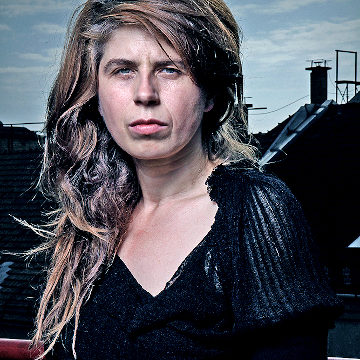
Dates: 4 > 10 July 2021 (10 am - 1 pm / 2 pm - 5 pm)
Language: English
For: Actors/actresses, performers (between 18 and 40 years old)
Participants: up to a maximum of 10
WORKSHOP
The body that speaks up
During studio work, Hód creates intimate situations in which participants are offered space and trust to open their physicality. Her method is based on improvisation that appears in a structured frame. Participants are invited to work on imagination and physical sensations, in couples and individually, as well. They are invited to discover the energy of breath, of voice work and the use of human voice as physical task and part of the body-work, to create forms throughout their physical sensations, to work with their own personal emotions and sensations in relation to their physicality.
Here, body and mind meet, just like in the blue colour interpreted by C.G. Jung as the symbol of depth (body) and height (mind).
The relation between physical and intellectual expression is crucial, and the starting point of the work is the body that “speaks up”. Thus, the participants will always work with their physical sensations and their body in movement. Get prepared to sweat!
ADRIENN HÓD
Her main profile is experimental movement and contemporary dance. She choreographs theatre pieces, films, TV advertisements, live performances and events. She regularly teaches improvisation and gives workshops related to Hodworks pieces.
During studio work she creates intimate situations in which dancers are offered space and trust to open up their physicality, sensations, emotions and verbalism. Hód’s method is based on improvisation that appears in a structured frame on stage. She is not afraid working on the unknown.
“In theatre, presence interests me more and more: the simultaneous presence of the spectator and the performer and their complete certainty of each other’s presence. On the one hand, the performer is present with attention and consciousness, observing the spectator. The other side is a little more evident, the viewer observes the performer, which has a clear effect on them. This face-to-face situation is what is interesting in its simplicity. What effect do I have as a performer on my surroundings and what effect does it have in me that I have an audience while I’m sharing many things on the stage?”
Photo: Nagy Gergő
In addition to the personal data requested, candidates must provide the following:
· a passport photo
· a full-length photo
· curriculum vitae (in English)
· link to a video showing the applicant in movement or (if available) show-reel from previous works showing the applicant in movement
· a statement (Pdf or Word) in English about the points of interest of the candidates: What format or type of theatre, what type of stage works are you interested in? How do you relate to physicality on stage as an artist? What processes are you interested in? Directing, playing, dramaturgy, choreography, etc.
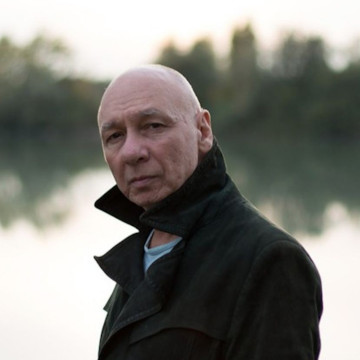
Dates: 5 > 11 July 2021 (9 am – 1 pm / 2 pm - 6 pm)
Language: Italian
For: Actors/actresses aged 20 to 40 with basic training and experience.
The workshop includes sections on movement that require an appropriate aptitude.
Participants: up to a maximum of 10
WORKSHOP
A workshop starting from Danio Manfredini and his personal artistic experience based on the research of the expressive possibilities of the actor, whom he conceives as a creator, as a living matter whose inspiration comes from a deep work on oneself, from one's intimacy and awareness.
Body as a fundamental place of listening and expression, exploration of vocality and emotional memory as parts of an actor's preparatory training.
The fundamental conventions belonging to the art of theatre will be considered. Acting is practised on texts taken from the classical and contemporary theatre repertoire.
In the East, "blue" is a colour that promotes meditation.
For me, drawing on the study of classical and contemporary theatre repertoire is a form of meditation on existence. Enlightened minds have written pictures of life, playwrights with philosophical, anthropological, psychological qualities. Instead of directly proposing their thoughts in the form of 'essays', they have captured the great themes of man in the details of human lives and enclosed them in plays.
For me, theatre is a form of meditation that goes beyond the mind through the body.
Feelings and emotions are lived and embodied by the actors and perhaps this is the reason that made me dwell more on this form of experience that theatre allows.
A glance at the sky reveals the "blue" as an unfathomable infinity. And this is perhaps also the metaphor of our existence.
D. Manfredini
DANIO MANFREDINI
He is one of the most intense voices in contemporary theatre. Author and performer of masterpieces such as Miracolo della rosa (Ubu Award 1989), Tre studi per una crocifissione, and Al presente (Ubu Award for Best Actor 1999). Other works include Cinema Cielo (Ubu Award for Best Director 2004) and Il sacro segno dei mostri. In 2012, he made his debut with Il Principe Amleto from Shakespeare's Hamlet, an Italian-French production. In 2013, he was awarded the Lo Straniero Prize as a "master of so many while stubbornly remaining on the fringes of mainstream circuits and resistant to the temptations of media success"; and also the special Ubu prize "for his artistic and pedagogical work as a whole, conducted with poetic obstinacy and the courage of fragility, without separating the expressive level from the transmission of the actor's art. This constant research, which has recently opened up to singing, has enabled him to become one of the rare masters in whom different generations of theatre can recognise themselves". From 2013 to 2016, he was the director of the Accademia d'Arte Drammatica of the Bellini Theatre in Naples. In 2014, he made his debut in Santarcangelo with Vocazione. Since 2010, his production company has been La Corte Ospitale. In September 2017, he debuted at the International Festival of Terni with the show Luciano. Since 2018, he has been leading "Repertorio. Scuola di alta formazione" at La Corte Ospitale. In October 2020, he debuted at the Festival delle Colline Torinesi with Nel lago del cor.
In addition to the personal data requested, candidates must provide the following:
· a passport photo
· a full-length photo
· curriculum vitae (in Italian)

Dates: 2 > 11 July 2021 (9 am - 1 pm / 2 pm - 6 pm)
Language: Italian
For: opera singers under 40
Participants: up to a maximum of 10
WORKSHOP
Blue: Water, sea, ocean, sky, night, movement, infinity: as the sky is reflected in the waters of rivers and seas, blue has become the colour that identifies them. Infinity, end, beginning, drifting towards the unknown:
New discoveries are only made when we let go of our old beliefs. The pleasure of drifting, the playful encounter with limits and the taste for error almost always lead us to discover new and unexpected qualities. Every kind of existence in front of an audience begins with the body. Physical memory never forgets. Therefore, the daily lesson will start with intense physical work. At the centre is the singer and their uniqueness on stage. “Man is only fully human where he plays" (Friedrich Schiller). Playing, joy and pleasure are the engine for fast learning, not only with children but also with adults. Body, voice, emotions, and mind work together to build the body of a complete and unique performer. Physical work to connect emotionally and uncompromisingly with your audience. A masterclass for singers who want to broaden their horizons, developing a very personal, physical, unconventional, and extremely joyful approach to their work on stage. Elements of acrobatics (everyone can do it because we work with individual needs and limitations), group training, energetic dance, stretching and relaxation exercises, yoga, pilates, shiatsu and feldenkrais are all part of this masterclass.
The masterclass also includes theoretical-practical work to find a scenic truth in the relationship with the other, as well as the awareness of one's own actions in space.
Based on the participants' vocal skills, some scenes from the Italian opera repertoire will be chosen.
These will be used to analyse the text and build a character.
An in-depth investigation of the interpretative registers of tragic, dramatic, comedy and comic, and all their combinations, will be carried out.
An attempt will be made to understand how to tell the same story in a different but equally authentic way, without ever mistaking originality for eccentricity. We will try to distinguish the what from the how, because a story is not only what is written, nor only what is said, but also the way it is told.
LEO MUSCATO
Director and playwright, he studied Literature and Philosophy at La Sapienza in Rome and directing at the Scuola d'Arte Drammatica "Paolo Grassi" in Milan.
Since 2001, he has staged some thirty classical and contemporary plays, produced by, among others, the Teatro Nazionale di Torino, Teatro Nazionale del Veneto, Teatro Nazionale di Genova, Teatro Stabile di Bolzano, Fondazione Teatro Due di Parma, Teatro Stabile delle Marche, Teatro Metastasio di Prato.
He has also staged about twenty operas for the Teatro Petruzzelli in Bari, Opéra de Monte Carlo, Maggio Musicale Fiorentino, Malmö Opera, L'ABAO in Bilbao, Bonn Opera House, Sferisterio in Macerata, La Fenice in Venice, San Carlo in Naples, Opera in Rome, Regio in Turin, Regio in Parma, Lirico in Cagliari, Greek National Opera.
In 2007, the National Association of Theatre Critics awarded him the Premio della Critica as Best Prose Director.
In 2012, the National Association of Music Critics awarded him the Abbiati Prize as Best Opera Director.
In 2016, the Fondazione Verona per l'Arena awarded him the International Opera Awards - Opera Star as Best Director.
In parallel to his work as a director, he works in the field of theatre pedagogy. His work has been the subject of degree theses at the Universities of Cremona, Urbino, Chieti, Macerata, and Roma Tre.
In 2020, his first film La rivincita was released, produced by Altre Storie, Rai Cinema and Apulia Film Commission.
NICOLE KEHRBERGER
She has 30 years of experience as an actress, acrobat, aerial artist and dancer on international stages.
She has won various acting awards in Italy (Critics' Award, Ubu Award, Adelaide Ristori Award) and internationally (Audience Award in Porto Alegre, Brazil). Since 1989, she has worked as an actress, aerial artist, dancer, choreographer, and director all over the world.
As an actress, she has worked in theatre, film and television with directors such as Antonio Latella, Jean Martin Moncéro, Stefane Lebard, Wolfram Hundhammer, Herms Meer, Naruna Kaplan de Macedo, John Mc Mullin, Peter Key, Joss Houben, Cédric Behrel and many others.
In 2005, she founded the theatre association Totales Theatre International together with artists of various origins. The first production, "Studio su Medea", directed by Antonio Latella (in co-production with the Teatro Stabile dell'Umbria and the Festival delle Colline Torinesi) won the UBU prize for the best play of the year.
In 2011, Nicole founded the International Theatre Summer School in Berlin. Every year actors, singers, dancers, and musicians from all over the world come here to take part in her courses.
In 2012, she and her partner Michele Andrei founded the Barfuss Theater am Schillerpark in Berlin, where they offer international courses. Since then, they have staged various theatre and music productions in their theatre.
RICCARDO FRIZZA
Appointed as music director of the Donizetti Opera Festival in Bergamo in 2017, Riccardo Frizza is invited to the world's most important theatres, musical institutions, and festivals, where he conducts many of the leading international orchestras. From the Metropolitan Opera in New York, to the Opéra National in Paris, La Scala in Milan, La Fenice in Venice, the San Carlo in Naples, the Teatro dell'Opera in Rome, the Maggio Musicale Fiorentino, the Teatro Regio in Turin, the Rossini Opera Festival, the Macerata Opera Festival, the Lyric Opera of Chicago, the Dallas Opera, the San Francisco Opera, the Müpa in Budapest, New National Theatre in Tokyo, Zurich Opernhaus, Bayerische Staatsoper, Gran Teatre del Liceu in Barcelona, ABAO Bilbao Opera, Teatro Real in Madrid, as well as many other theatres in Italy, Spain, Germany, Japan, China, Switzerland, France and the United States, where he has conducted Italian operas by composers such as Donizetti, Bellini, Rossini, Verdi and Puccin
In the symphonic field, he has conducted, among others, the Orchestra dell'Accademia Nazionale di S. Cecilia, the Sachsische Staatskapelle in Dresden, the Orchestra Sinfonica di Milano "G. Verdi", the Mahler Chamber Orchestra, the St. Petersburg Philharmonic Orchestra, the Philharmonia Orchestra of London, the Tokyo Symphony Orchestra, the Hungarian Radio Symphony Orchestra and the Orchestra del Maggio Musicale Fiorentino. He was recently named Best Music Conductor for the year 2020 by the International Opera Awards.
Photo: Joan Tomás
In addition to the personal data requested, candidates must provide the following:
· a passport photo
· a full-length photo
· curriculum vitae (in either Italian or English)
· motivational letter (in Italian or English)
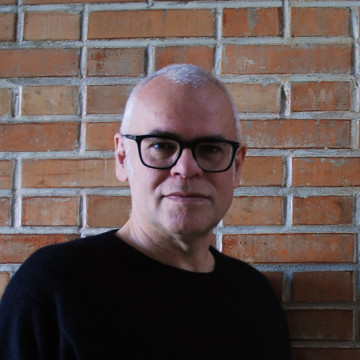
Dates: 2 > 11 July 2021
The schedule will be established in the editorial office according to the activities of the Biennale Teatro. It will continue all day starting at 10 am.
Language: Italian
For: Graduates - at least a three-year degree - with writing practice and knowledge of theatre history and contemporary theatre (under 30).
Participants: 6
WORKSHOP
Blue is the colour of this Biennale Teatro. Azul, Pablo Picasso would have said. In his "blue period", Picasso lived on hardship. Had the critics noticed him? Yet, he was already the genius he was to become. Who understood him? What responsibility does criticism have with respect to its own time? Here is the question: how to look at the contemporary?
Starting again from a blue critique: to face the depression of these dark times. With intense work. An editorial staff capable of following events, workshops, meetings. A space open to criticism and discussion. Theory and practice: reviews, doubts, questions, interviews, in-depth analysis. Writing, understanding, correcting. Every day, to rediscover the sense of ritual, of sharing, of theatre as a place of discursive democracy, of political practice. Of the contemporary in theatre. Now more than ever.
ANDREA PORCHEDDU
Graduated in Philosophy of Law, he has been working on theatre since 1988 both as a critic and a scholar. He has collaborated with various national newspapers, online, in print, radio and TV. He currently writes for L'Espresso, glistatigenerali.com, antinomie.it, Che-fare.com, Lettre International and speaks as an author and presenter on RAI Radio3. During his career, he has founded and contributed to the life of several newspapers, including Teatro/Pubblico, Primafila, Pagina99. He has written books on Emma Dante, Ascanio Celestini, Virgilio Sieni, Ricci/Forte, Arturo Cirillo, Pierpaolo Sepe and many other artists. He teaches courses in Methodology of Criticism at the University of Rome "La Sapienza" and at the Accademia d'Arte Drammatica "Silvio d'Amico". He has curated criticism workshops at the Biennale Teatro in Venice, from 2010 to 2016 and in various other Italian festivals. He has devoted himself to critical theories applied to the stage with the book "Questo fantasma, il critico a teatro" (Titivillus publisher). He edits the series "Guide Teatrali" of Cue Press, with which he published the book “Che c’è da guardare? La critica di fronte al teatro sociale d’arte” (2017) and the more recent "Altri corpi/nuove danze? (2019) dedicated to the interaction between choreography and discomfort. With Luca Sossella Editore, he has published "Il respiro di Dioniso, il teatro di Theodoros Terzopoulos" (2020). He has directed festivals and served on international (Sarajevo, Tehran) and national juries, and in 2012 he served as artistic director of the Bahrain National Theatre. In 2021, he became Dramaturg of the Teatro nazionale di Genova.
In collaboration with ROBERTA FERRARESI, theatre historian and theatre critic.
In addition to the personal data requested, candidates must provide the following:
· a passport photo
· a curriculum vitae (in Italian)
· motivational letter (in Italian)
· two articles/reviews written by the candidate as particularly representative (Pdf or Word)
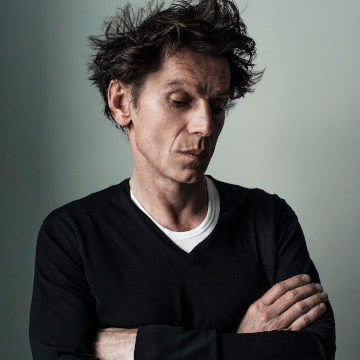
Dates: 4 > 10 July 2021 (11 am – 1.30 pm / 2.30 pm - 5 pm)
Language: English
For: experienced directors and dramaturgs (aged 25 > 40 years)
Participants: up to a maximum of 10
WORKSHOP
My masterclass will be devoted to the adaptation of the text. The possibilities offered by the encounter with the text in which we have a chance to install ourselves. Ourselves and the theatre. I propose to work with the novel by J.M. Coetzee's "Elizabeth Costello".
Each of the participants should prepare their own adaptation draft. I am not asking for summaries or for trying to “squeeze” the text into theatre. Please install yourself in the text.
Blue, for me, is a color that protects from madness. Especially the shade from the work of Luca Della Robbia. Blanche DuBois convinced me to this:
Blanche
I’m anxious to get out of here – this place is a trap!
Eunice
What a pretty blue jacket.
Stella
It’s lilac colored.
Blanche
You are both mistaken. It’s Della Robbia blue. The blue of the robe in the old Madonna pictures.
K. Warlikowski
KRZYSZTOF WARLIKOWSKI
One of the most prominent European theatre and opera directors, born in Poland in 1962. He has created a new way of staging Shakespeare, his body of work contains also subversive interpretation of Greek tragedies. Moreover, he is well known for his staging of modern authors.
Since 2008 he has been the Artistic Director of Nowy Teatr in Warsaw, where he has so far directed six shows: (A)pollonia, The End, African Tales by Shakespeare, Kabaret warszawski, The French, and We Are Leaving. He staged two performances in Odéon in Paris: Streetcar and Phaedra(s) with Isabelle Huppert in the leading role.
Warlikowski’s theatre productions were presented at the most important festivals: Festival d’Avignon, Festival de Otoño in Madrid, Edinburgh International Festival, Wiener Festwochen, Next Wave Festival BAM in New York, Athens Festival, International Theatre Festival Santiago a Mil, Seoul Performing Arts Festival.
A separate field of Krzysztof Warlikowski’s work involves opera, he directs in the greatest European opera houses (La Monnaie in Brussels, the Paris National Opera, Teatro Real in Madrid, Bayerische Staatsoper in Munich, Royal Opera House in London, Festival d’Aix en Provence, Rurhtriennale and Salzburg Festival).
Krzysztof Warlikowski is a winner of numerous awards, including the Award of the French Theatre Critics’ Union in 2003 for Sarah Kane’s Cleansed and in 2008 for Angels in America. In 2006 he received the Meyerhold Award in Moscow, and in 2008, the X Europe Prize “New Theatrical Realities” in Thessaloniki. The same year New York’s Village Voice gave Krzysztof Warlikowski its Obie Award for the direction of Krum by Hanoch Levin. He was awarded the “Golden Mask” prize for the best foreign performance shown in Russia in 2011 for (A)pollonia.
Photo: Maurycy Stankiewicz
In addition to the personal data requested, candidates must provide the following:
· a passport photo
· a full-length photo
· curriculum vitae (in either English, French or Italian)
· the recording of a show (directors)
· a script (dramaturgs) (in either English, French or Italian)